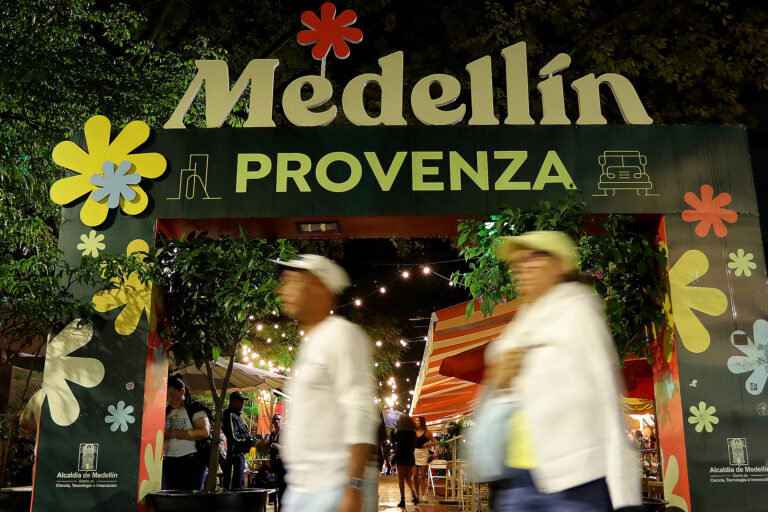A 25-year-old American was found dead last Thursday in one of the many luxury hotels in the chic El Poblado district of Medellín, Colombia. Matthew Watson Cluellet remembered nothing except the name of the hotel and was confused when he hopped into a taxi early in the morning. According to police reports, hotel staff noticed that Cluellet had taken drugs and seemed unwell. His body was found in his room at 9:30 a.m.
Klull is the 29th tourist to have died in violent or mysterious circumstances in Medellin so far this year, averaging more than one a week, a rate that would bring Medellin’s 61st tourist death so far this year.

Tourists walk through the Provenza neighborhood in Medellin, Colombia, on June 13, 2024. At night, sex workers go to work in this Colombian city where tourism has led to a rise in prostitution involving underage girls.
The birthplace of drug lord Pablo Escobar, Medellin was once notorious as one of the most dangerous cities in the world, but over the years it has rebuilt its reputation and is now one of the world’s most popular summer destinations. Last year, Time Out magazine named it the coolest city in the world.
But the surge in tourism has also brought an increase in crime targeting tourists. On May 31, another American was found dead in a hotel in the tourist town of Laureles. Jaime Eduardo Cisneros, 54, was found lying in bed, partially naked and wrapped in sheets, but there were no signs of violence. Authorities said Cisneros had entered the room with a woman in the early hours of the morning, but the woman left alone.
The recent fatalities have drawn international attention to the risks associated with traveling to Medellín. The U.S. Embassy in Bogota, Colombia’s capital, issued a warning in January about the dangers posed by criminals using dating apps to lure, drug and rob tourists, highlighting high-profile cases of Americans being robbed after “matching” on apps like Tinder, Bumble and Grindr.
Many of the deaths are attributable to scopolamine, a drug used to treat nausea and vomiting caused by motion sickness. Known as “devil’s breath,” scopolamine has long been a favorite drug of criminals to incapacitate victims during robberies and sex crimes.
Jiri Milena Amado, a former head of the regional prosecutor general’s office, said a “lethal mixture” of drugs and alcohol was often found in the bodies of dead tourists.
Drug-fueled banditry is undermining Colombia’s efforts to become more tourist-friendly and shed its reputation for drugs and violence. The U.S. State Department has issued a travel advisory categorizing Colombia at “Level 3: Reassessment,” one level below the most severe “Level 4: Do Not Travel,” citing crime, terrorism, civil unrest and kidnappings.
“Drugs, drug culture, prostitution.”
Colombian authorities say it is safe to travel to Medellin, and they blame the violence on tourists seeking drugs, drug culture and prostitution.
“The situations in which foreign tourists are negatively affected are most often linked to drugs and prostitution,” Carlos Calle, head of tourism monitoring at the Medellin prosecutor’s office, said in an interview with Spanish newspaper El Pais.

A market stall in Medellin selling a variety of Pablo Escobar-related souvenirs and merchandise. Items include T-shirts, hats, magnets, mugs, shot glasses, and bracelets featuring Escobar’s image. A market stall in Medellin selling a variety of Pablo Escobar-related souvenirs and merchandise. Items include T-shirts, hats, magnets, mugs, shot glasses, and bracelets featuring Escobar’s image. Getty Images
Some tourists have become caught up in sex trafficking networks involving minors. One notorious case is that of Timothy Allan Livingston, a 36-year-old American who was found by police in a hotel in El Poblado with two girls, ages 12 and 13.
According to Colombian law, sexual consent with a minor under the age of 16 is granted only if the person seeking sex is within three years of the minor’s age. Livingston was released shortly after his arrest and returned to Florida. A Colombian judge issued a warrant for his arrest in April, but he remains a fugitive in the United States.
In response to the case, Medellin Mayor Federico Gutierrez issued a six-month ban on prostitution in tourist areas to combat child sexual exploitation. “I want Medellin to be an example in the fight against child sexual exploitation,” he said.
For the past three months, posters have been put up around the city trying to prevent the sexual abuse of minors, with messages like “Don’t even try, it’s a crime.”
For nearly two decades, Medellín has been actively trying to shake off its notorious drug trafficking past. In 2019, Mayor Gutierrez ordered the demolition of the infamous Monaco Building, where Escobar famously lived and worked. Casa Museo Escobar, a museum run by Escobar’s brother, Roberto “El Osito” Escobar, was also closed.
Since Escobar’s death in 1993, Medellín has focused on urban renewal, social programs and promoting cultural and technological progress, and its transformation has been internationally recognized. Many of the streets once dominated by Escobar’s Medellín Cartel are now lined with fine restaurants and glass hotels. Nevertheless, Medellín remains home to many criminal gangs, attracted by the growing number of tourists and lingering illegal activity.
Have a story you think Newsweek should feature? Have a question about this article? Contact us at LiveNews@newsweek.com.
Rare knowledge
Newsweek is committed to challenging conventional wisdom, seeking common ground and finding connections.
Newsweek is committed to challenging conventional wisdom, seeking common ground and finding connections.

